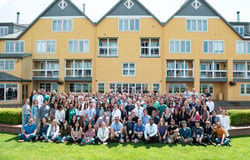At Google DeepMind, we value diversity of experience, knowledge, backgrounds and perspectives and harness these qualities to create extraordinary impact. We are committed to equal employment opportunity regardless of sex, race, religion or belief, ethnic or national origin, disability, age, citizenship, marital, domestic or civil partnership status, sexual orientation, gender identity, pregnancy, or related condition (including breastfeeding) or any other basis as protected by applicable law. If you have a disability or additional need that requires accommodation, please do not hesitate to let us know.
Snapshot
Artificial Intelligence could be one of humanity’s most useful inventions. At Google DeepMind, we’re a team of scientists, engineers, machine learning experts and more, working together to advance the state of the art in artificial intelligence. We use our technologies for widespread public benefit and scientific discovery, and collaborate with others on critical challenges, ensuring safety and ethics are the highest priority.
About Us
Our team aims to build and improve state of the art generative models for images, videos and other modalities. We are interested in candidates familiar with the latest generative modelling techniques such as dvariational auto-encoders,iffusion models, generative adversarial models, etc. You will need to be able to understand and work on the promising research directions, and implement them at scale. Therefore, both a strong theoretical background and a hand-on experience with large-scale machine learning is required. You will collaborate closely with other leading researchers, contributing to the development of cutting edge generative models and translating research into products across Google and externally.
The Role
We’re looking for a Research Engineer with exceptional engineering skills and understanding of large scale data processing, as well as a strong working knowledge of machine learning experimentation.
Key responsibilities:
- Develop, maintain and improve large scale data pipelines that generate Gemini’s pre-training data which is critical to the quality and capabilities of Gemini models.
- Conduct careful empirical research to validate novel datasets and novel data processing techniques.
- Collaborate with team members to develop scaling laws and understanding of how large scale training and large scale data interact.
- Collaborate with the wider Gemini team, enganging closely with the Model, Infrastructure and the Post-Training teams.
About You
In order to set you up for success as a Research Engineer at Google DeepMind, we look for the following skills and experience:
- A proven track record of working with large scale data processing pipelines
- A proven track record of empirical experimentation such as work in deep learning of empirical sciences.
- A strong background in large scale engineering, understanding of distributed systems.
In addition, the following would be an advantage:
- A degree or PhD in machine learning or closely related field, or similar experience
- Experience with Large Language model training
- Experience with working on deep learning, especially on creating deep learning datasets.
Applications Close on Friday 29th November 2024
Top Skills
What We Do
We’re a team of scientists, engineers, machine learning experts and more, working together to advance the state of the art in artificial intelligence. We use our technologies for widespread public benefit and scientific discovery, and collaborate with others on critical challenges, ensuring safety and ethics are the highest priority.
Our long term aim is to solve intelligence, developing more general and capable problem-solving systems, known as artificial general intelligence (AGI).
Guided by safety and ethics, this invention could help society find answers to some of the world’s most pressing and fundamental scientific challenges.
We have a track record of breakthroughs in fundamental AI research, published in journals like Nature, Science, and more.Our programs have learned to diagnose eye diseases as effectively as the world’s top doctors, to save 30% of the energy used to keep data centres cool, and to predict the complex 3D shapes of proteins - which could one day transform how drugs are invented.








